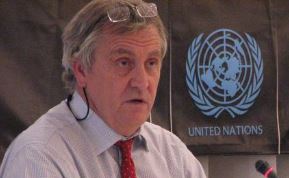The Special Representative of the Secretary-General and head of the UN Mission in South Sudan (UNMISS) on Thursday urged parties to the 2018 peace agreement to come up with a unified work plan for the next two years.
Nicholas Haysom who was speaking at the at Reconstitution Joint Monitoring and Evaluation Commission (RJMEC) Plenary meeting in Juba also noted that six weeks have passed since the decision to extend the transitional period was made.
“I urged the parties then to employ a sense of urgency in making good on the promises they made to the people of South Sudan. I also emphasized the importance of producing a clear, realistic, harmonized work plan for the next two years, which will go a significant way to restore confidence among citizens and the international community that the political leadership of this country is committed to implementing the outstanding provisions of the Peace Agreement and concluding the transition through peaceful and credible elections,” he said. “To date, that realistic, harmonized timeline has not been forthcoming, and I would like to remind the parties that the clock is ticking. It won’t restart in February 2025, it is ticking as we speak here today. I note the various appeals for funds up front, including by the technical bodies, but let me emphasize that requests for external or international financing need to be backed up with demonstrable proof that national financial resources are being prioritized for long overdue steps and that the South Sudanese themselves are capable of displaying the political will necessary to conclude this project.”
Haysom said there are opportunities for quick wins that the parties must seize and that they have identified a number of achievable benchmarks which they assess that with a sense of urgency, the parties can address by February 2025: (1) the deployment of the necessary unified forces (NUF) and agreeing on the middle command structure of those forces, (2) civic education, (3) preparatory work towards voter registration, (4) amending the National Security Services Bill, (5) developing a code of conduct between political parties, but also, with civil society and the media, and, (6) developing the political and open space that civil society has been so insistent on.
“We also like to see clarity on responsibility-sharing on electoral security. These tasks have been under consideration for some time now and need decisions, not further delay,” Haysom stated. “On our part, we have decided to charge ahead and are expanding our assistance to the National Elections Commission beyond technical discussions and capacity building, and we are exploring packages of support, concrete brick and mortar, that combine hardware (such as state electoral offices) and software (such as capacity-building and training initiatives).”
“We also have a significant amount of in-house electoral, political, and law enforcement expertise to dedicate in this area of our mandate, including as it relates to electoral security issues. Let me add, to our offer, I know both the AU and IGAD will also contribute to making good this promise,” he added.
The UNMISS Chief revealed that he met President Salva Kiir on Wednesday and discussed the urgency that is necessary to make progress.
“President Kiir expressed support for our efforts and recommitted to accelerate implementation,” he said.
“I, therefore, urge the Government to reconvene the monthly Joint Task Force meetings with the UN, AU, IGAD, and Troika to support the prioritization and resourcing of the constitution-making and electoral processes.”
According to Haysom, subnational violence remains a significant concern affecting civilians across South Sudan, as documented in the Mission’s latest quarterly brief, which highlights a 43 percent increase in the number of violent incidents compared to the same period last year.
He noted that right now, there is limited progress to report on the implementation of the peace processes since the extension.
“The UN stands ready to support the Government to fulfill promises it has made to its people and to complete the transition. First, though, its leaders must take the necessary decisions and take the actions which are required to show that they are ready to apply South Sudan’s resources in the name of peace,” Haysom concluded. “This is a critical requirement to ensure that South Sudan graduates out of its perpetual transitional period.”
Thank you.




